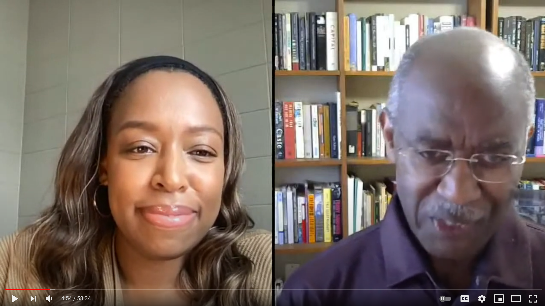John Henryism

Much of the work at the Center for Family Research today, and in recent years, examines the effects of stress on brain functioning, addictive behaviors, and metabolic disease among African Americans (see Skin-Deep Resilience). The theoretical and empirical work by Dr. Sherman James informed the research undertaken by CFR scientists on how stress gets under the skin and into the brains of African American young people and adults. Dr. James proposed the “John Henryism” hypothesis which acknowledged the health costs of overcoming economic hardships and racial discrimination. The hypothesis proposed that having a single-minded determination to succeed while contending with structural racism makes it more likely that African Americans will develop hypertension and cardiometabolic diseases.
This video explains the origin of the idea with its creator, Sherman James.

Sherman James spoke with UGA’s Sycarah Fisher for our 2021 Gene Brody Symposium about how the theory came about, what we have learned since he first proposed it in the early 1980s, and what outstanding questions remain. Watch the conversation below.
Another useful video resource is the documentary “Sherman James and the John Henryism Hypothesis” (2018) from Karin Shapiro at Duke University.
Bibliography of John Henryism
Key Papers from Sherman James
James, S. A. (1993). The narrative of John Henry Martin. Southern Cultures [Inaugural issue], 83-106. https://www.jstor.org/stable/44376399
James, S. A. (1994). John Henryism and the health of African-Americans. Culture, Medicine, and Psychiatry, 18(2), 163-182. https://doi.org/10.1007/BF01379448
James, S. A., Hartnett, S. A., & Kalsbeek, W. (1983). John Henryism and blood pressure differences among Black men. Journal of Behavioral Medicine, 6(3), 259-278. https://doi.org/10.1007/BF01315113
James, S. A., Keenan, N. L., Strogatz, D. S., Browning, S. R., & Garrett, J. M. (1992). Socioeconomic status, John Henryism and blood pressure in Black adults: The Pitt County Study. American Journal of Epidemiology, 135(1), 59-67. https://doi.org/10.1093/oxfordjournals.aje.a116202
James, S. A., Strogatz, D. S., Wing, S. B., & Ramsey, D. L. (1987). Socioeconomic status, John Henryism, and hypertension in Blacks and Whites. American Journal of Epidemiology, 126(4), 664-673. https://doi.org/10.1093/oxfordjournals.aje.a114706
Reviews of John Henryism
Bennett, G. G., Merritt, M. M., Sollers, J. J. III, Edwards, C. L., Whitfield, K. E., Brandon, D. T., & Tucker, R. D. (2004) Stress, coping, and health outcomes among African-Americans: A review of the John Henryism hypothesis. Psychology & Health, 19(3), 369-383. https://doi.org/10.1080/0887044042000193505
Robinson, M. N., & Thomas Tobin, C. S. (2021). Is John Henryism a health risk or resource? Exploring the role of culturally relevant coping for physical and mental health among Black Americans. Journal of Health and Social Behavior, 62(2), 136-151. https://doi.org/10.1177/00221465211009142
Related Papers from CFR
Brody, G. H., Yu, T., & Beach, S. R. H. (2016). Resilience to adversity and the early origins of disease. Development and Psychopathology, 28(4, pt. 2), 1347-1365. https://doi.org/10.1017/S0954579416000894
Brody, G. H., Yu, T., Chen, Y.-f., Kogan, S. M., Evans, G. W., Beach, S. R. H., Windle, M., Simons, R. L., Gerrard, M., Gibbons, F. X., & Philibert, R. A. (2013). Cumulative socioeconomic status risk, allostatic load, and adjustment: A prospective latent profile analysis with contextual and genetic protective factors. Developmental Psychology, 49(5), 913-927. https://doi.org/10.1037/a0028847
Brody, G. H., Yu, T., Chen, E., & Miller, G. E. (2020). Persistence of skin-deep resilience in African American adults. Health Psychology, 39(10), 921-926. https://doi.org/10.1037/hea0000945
Brody, G. H., Yu, T., Chen, E., Miller, G. E., Kogan, S. M., & Beach, S. R. H. (2013). Is resilience only skin deep? Rural African Americans’ socioeconomic status-related risk and competence in preadolescence and psychological adjustment and allostatic load at age 19. Psychological Science, 24(7), 1285-1293. https://doi.org/10.1177/0956797612471954
Brody, G. H., Yu, T., Miller, G. E., & Chen, E. (2016). Resilience in adolescence, health, and psychosocial outcomes. Pediatrics, 138(6), Article e20161042. https://doi.org/10.1542/peds.2016-1042
Brody, G. H., Yu, T., Miller, G. E., Ehrlich, K. B., & Chen, E. (2018). John Henryism coping and metabolic syndrome among young Black adults. Psychosomatic Medicine, 80(2), 216-221. https://doi.org/10.1097/PSY.0000000000000540
Chen, E., Yu, T., Siliezar, R., Drage, J. N., Dezil, J., Miller, G. E., & Brody, G. H. (2020). Evidence for skin-deep resilience using a co-twin control design: Effects on low-grade inflammation in a longitudinal study of youth. Brain, Behavior, and Immunity, 88, 661-667. https://doi.org/10.1016/j.bbi.2020.04.070
Miller, G. E., Chen, E., Yu, T., & Brody, G. H. (2020). Youth who achieve upward socioeconomic mobility display lower psychological distress but higher metabolic syndrome rates as adults: Prospective evidence from Add Health and MIDUS. Journal of the American Heart Association, 9(9), Article e015698. https://doi.org/10.1161/JAHA.119.015698
Miller, G. E., Chen, E., Yu, T., & Brody, G. H. (2020). Youth who achieve upward socioeconomic mobility display lower psychological distress but higher metabolic syndrome rates as adults: Prospective evidence from Add Health and MIDUS. Journal of the American Heart Association, 9(9), Article e015698. https://doi.org/10.1161/JAHA.119.015698
